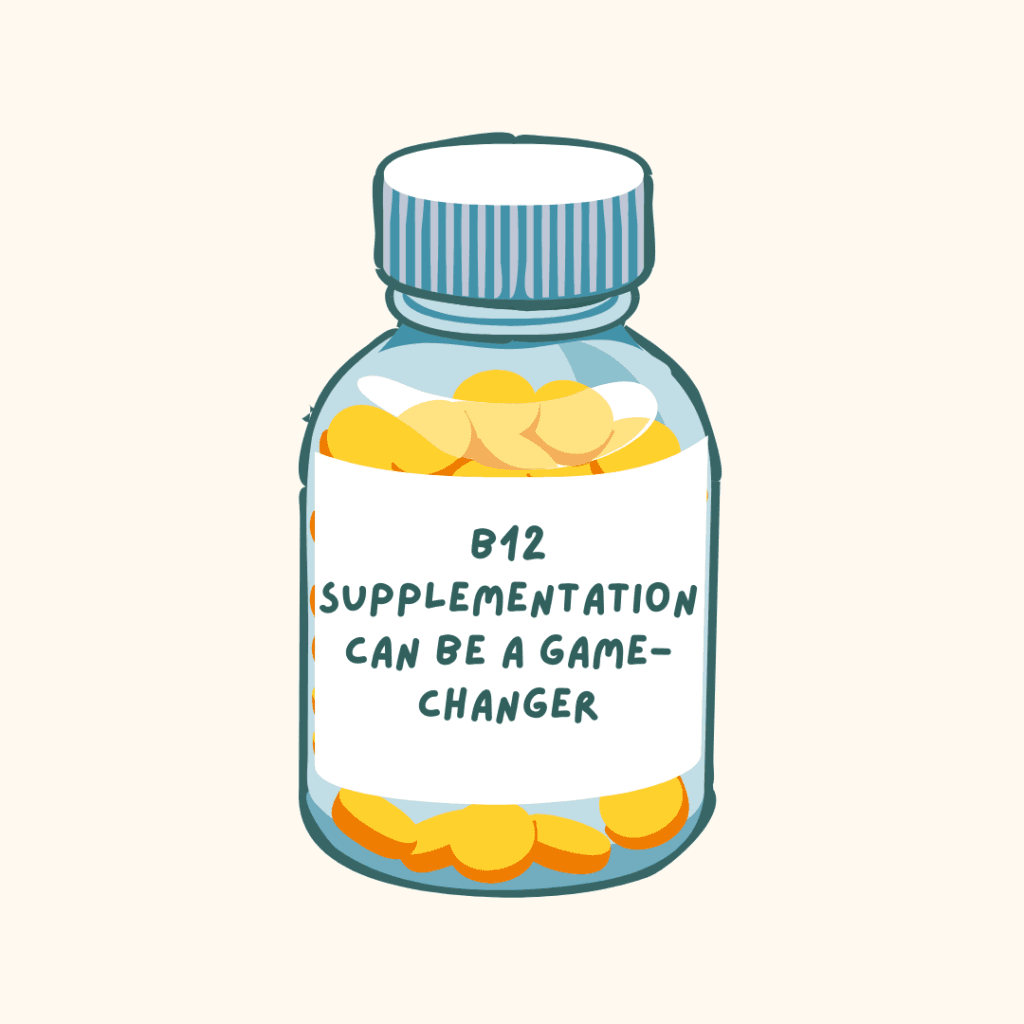Vitamin B12, often overlooked in our daily nutritional intake, plays a pivotal role in various bodily functions, including nerve function, DNA synthesis, and red blood cell formation. Despite its importance, many individuals may unknowingly suffer from B12 deficiency, leading to a myriad of health issues. In this article, I delve into the potential life-changing impact of B12 supplementation, why it’s essential, common symptoms of deficiency, and how supplementation can make a significant difference.
The Importance of Vitamin B12: Vitamin B12, also known as cobalamin, is a water-soluble vitamin that the body cannot produce on its own. It is primarily found in animal products such as meat, fish, dairy, and eggs. B12 plays a crucial role in:
- Nerve Function: B12 is essential for maintaining the health of the nervous system, including the formation of myelin, a protective sheath around nerves that facilitates proper nerve impulse transmission.
- DNA Synthesis: B12 is involved in the synthesis of DNA, the genetic material found in all cells. Adequate B12 levels are necessary for cell division and the production of new cells.
- Red Blood Cell Formation: B12 is required for the production of red blood cells in the bone marrow. Deficiency in B12 can lead to a type of anaemia known as megaloblastic anaemia, characterised by large, immature red blood cells.
Why You Might Need B12 Supplementation:
Despite the importance of B12, many individuals may not consume enough through their diet or may have difficulty absorbing it from food sources. Certain groups of people are at a higher risk of B12 deficiency and may benefit from supplementation, including:
- Vegetarians and Vegans: Since B12 is primarily found in animal products, individuals following a vegetarian or vegan diet may be at risk of deficiency if they do not consume fortified foods or supplements.
- Older Adults: As we age, the body’s ability to absorb B12 from food decreases. Older adults may have reduced stomach acid production or gastrointestinal conditions that impair B12 absorption, putting them at risk of deficiency.
- Individuals with Gastrointestinal Disorders: Conditions such as celiac disease, Crohn’s disease, or atrophic gastritis can affect the absorption of B12 from food, leading to deficiency.
- People on Certain Medications: Certain medications, such as proton pump inhibitors (PPIs) used to treat acid reflux, and metformin, used to manage diabetes, can interfere with B12 absorption and increase the risk of deficiency.
Common Symptoms of B12 Deficiency:
B12 deficiency can manifest in various ways and may present with a range of symptoms, including:
- Fatigue and Weakness: B12 deficiency can lead to fatigue and weakness, impacting overall energy levels and vitality.
- Numbness or Tingling Sensations: Damage to the nerves caused by B12 deficiency can result in numbness, tingling, or a “pins and needles” sensation, especially in the hands and feet.
- Difficulty Walking or Balance Problems: Severe B12 deficiency can affect coordination and balance, leading to difficulty walking or an unsteady gait.
- Pale or Jaundiced Skin: B12 deficiency can cause megaloblastic anaemia, resulting in pale or yellowish skin due to decreased red blood cell production.
- Cognitive Impairment: B12 deficiency may impair cognitive function, leading to memory problems, confusion, or difficulty concentrating.
How B12 Supplementation Can Help:
B12 supplementation can be a game-changer for individuals experiencing symptoms of deficiency. By restoring B12 levels to optimal range, supplementation can:
- Boost Energy Levels: Adequate B12 levels are essential for energy production, and supplementation can help alleviate fatigue and improve overall vitality.
- Support Nerve Health: B12 is crucial for nerve function and can help prevent or alleviate symptoms such as numbness, tingling, and balance problems.
- Improve Cognitive Function: B12 supplementation may enhance cognitive function and memory, helping individuals think more clearly and maintain mental sharpness.
- Prevent Anaemia: By supporting red blood cell formation, B12 supplementation can help prevent or treat megaloblastic anaemia, restoring healthy blood cell production.
- Enhance Overall Well-Being: Optimal B12 levels are essential for overall health and well-being, and supplementation can contribute to improved quality of life and vitality.
Final Thoughts:
Vitamin B12 is a vital nutrient with far-reaching implications for overall health and well-being. Deficiency in B12 can have significant consequences, impacting energy levels, nerve function, and cognitive health. Fortunately, supplementation with B12 can be life-changing for individuals experiencing symptoms of deficiency, providing a boost in energy, supporting nerve health, and enhancing overall vitality. If you suspect you may be deficient in B12 or belong to a high-risk group, consult with a healthcare professional to determine the appropriate supplementation regimen and take proactive steps towards better health and vitality.




